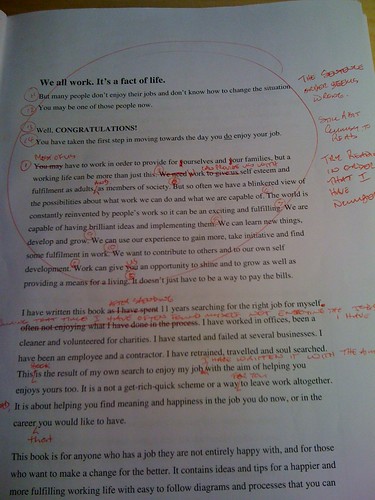
Editing for Grammar, Spelling and Punctuation
Editing
serves a main function for any piece of writing: it makes it readable.
In today's day of visible spellcheck and auto-correct, it's easy to
simply write along without worry about spelling each and every word the
right way. Who has time to worry about putting i before e and doubling the l
when changing the tense? It's a lot to think about, especially when
you're trying to create interesting characters and weave them together
in a believable, enjoyable story. It's okay to just focus on your
writing, and get that done...but after that, it's time for the really hard work.
You should read through your book in entirety more than once
to check all the grammar, spelling and punctuation. Readers are going
to be instantly turned off by mistakes. Errors are frustrating to
readers, and it won't help you sell your work. You cannot rely on
spellcheck to get everything right. You have to read your work, line by
line, to make sure it's perfectly written.
And once you've checked all the words and every period to make sure it's correct, you're all done, right? No...not by half.
Editing for Readability and Plot
A
technically perfect story is all well and good, but no one is going to
be interested if the story isn't entertaining. While you're checking all
the technical stuff, check your story for readability. Make sure the
plot hangs together and everything is smooth. If you don't laugh when
you read it, the story isn't funny. If you don't cry, your readers
won't. If you don't understand it, no one else will. While you're
reading, pretend it's not your story. Tell yourself it's someone else's
work, and look at it through objective eyes. You characters should be
consistent and true to the characteristics you've given them, your plot
should move along (and not drag, because that's boring) and the climax
of the story should truly be the most exciting part of the whole book.
If possible, take a break from your work for a week between edits. Then
come back and edit again with fresh eyes.
When's the Work Over?
So, you've edited for all the technicalities. You've edited for the readers. When the heck are you done editing? There's no hard and fast rules when it comes to editing, because every writer operates differently, but a good rule of thumb for editing is that you're ready to stop when you read your work and can't find a single mistake. Maybe it'll take two reads, maybe it'll take twenty-two reads, but if you're still finding mistake then you still aren't done editing. It's a real drag to edit and edit (and then edit some more), meaning it's extremely tedious, but the end result is worth it. A well-edited book looks professional and makes a good impression.
Would you rather have your work remembered as a sloppy mess, or a neat and concise work that reads well?





0 comments:
Post a Comment